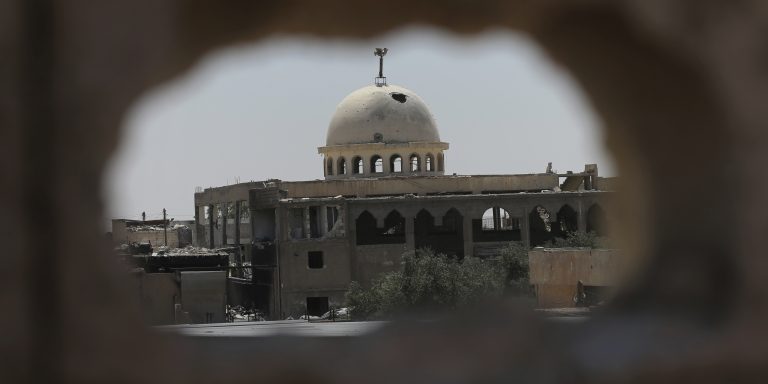INTELBRIEF
January 25, 2018
IntelBrief: Rebuilding Raqqa

- The battle for Raqqa was intense; while it achieved the categorical imperative of toppling the Islamic State, it destroyed the city and surrounding areas in the process.
- Along with the Administrator for the U.S. Agency for International Development (USAID), Mark Green, General Joseph Votel, head of the U.S. Central Command, pressed for more help rebuilding Raqqa in the aftermath of the military campaign.
- The U.S. and others are acutely aware of the need to address local concerns that gave rise to the Islamic State.
- The U.S. has relatively little leverage over events in Syria, with the added difficulty of Iran and Russia being determined to advance their interests.
As the U.S. and coalition partners’ military campaign to defeat the so-called Islamic State winds down in places ridden by conflict, the enormity of the task ahead is revealing itself. General Joseph Votel, head of the U.S. Central Command—responsible for the conflicts in Iraq, Syria, and Afghanistan—made an unannounced visit to Raqqa, Syria, on January 22. Such a trip, even several months ago, would have been unimaginable and is a sign of how far the Islamic State has been pushed back since it was at the height of its power. Once a city of 200,000, Raqqa had no more than 5,000 Islamic State fighters and families when it finally fell to the U.S.-supported Syrian Democratic Force (SDF). The battle for Raqqa was intense; while it achieved the categorical imperative of toppling the Islamic State, it destroyed the city and surrounding areas in the process.
General Votel was in Raqqa to highlight the need for a more robust effort by the international community to help rebuild what has been destroyed, and to address the root causes—abysmal local governance, sectarian and tribal grievances, ecological and economic pressures—that allowed groups like the Islamic State to thrive. He was accompanied by Mark Green, the administrator for the U.S. Agency for International Development (USAID). The U.S. is not leaving Syria anytime soon, stating several times in recent weeks that it is committed to maintaining a presence there and supporting groups like the SDF until there is a credible peace plan in place.
Rebuilding in Syria will be an altogether different challenge than in Iraq and Afghanistan. Importantly, the U.S. won’t have a partner in local government, assuming the Assad regime stays in power. Further, the U.S. has relatively little leverage over events in Syria, and will have the added difficulty of Iran and Russia being ever more determined to advance their respective interests there, while thwarting Washington’s efforts at future influence. Rebuilding Raqqa under those conditions will be impossibly hard—and the job will be even harder in areas like Aleppo and Idlib, which have the added handicap of having far fewer resources available.
Even in countries with relatively favorable conditions—in terms of having a supportive local government, less open regional interference, and far more resources and funding, as is the case in both Iraq and Afghanistan—the U.S. and coalition partners have not been able to adequately begin a process of rebuilding. Making strides in rebuilding Syria will require a massive international effort. When asked by Defense One during his visit to Raqqa who should be doing more in terms of helping translate a military victory into lasting political success, General Votel simply stated ‘everyone.’
For tailored research and analysis, please contact: info@thesoufancenter.org
[video width="960" height="540" mp4="https://thesoufancenter.org/wp-content/uploads/2018/01/Fianl-Edit-1-117.mp4" poster="https://thesoufancenter.org/wp-content/uploads/2018/01/AP_17207654805849.jpg"][/video]